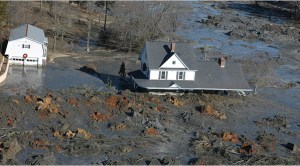Yesterday (Wednesday, January 6) The Southern Alliance for Clean Energy (SACE) asked if they could repost R&P’s post from Tuesday, January 5th about Georgia Power pumping water from their Plant Branch coal ash ponds into Lake Sinclair over the weekend.
They reposted, and Georgia Power picked up the phone and set up a conference call with SACE and Jen Hilburn, the Altamaha Riverkeeper who discovered the pumping last weekend.
SACE has added this to their reposting of my original blog:
Subsequent to our posting of this article, Georgia Power contacted us to clarify that emergency overflow pumping was taking place as part of their emergency response plans, consistent with the facility’s permit, due to unusually high rainfall. The overflow is designed to prevent water over-topping the dyke and damaging it through erosion. While overflow water comes from the surface of the pond and has less exposure to toxic ash, which settles to the bottom, we remain concerned about the risks of wet ash storage demonstrated by this episode. Georgia Power aims to publish closure plans for all its ash ponds in Spring 2016 and we look forward to reviewing those plans to ensure they keep ash in lined facilities away from waterways.
Like SACE and the Altamaha Riverkeeper, I am very concerned about both the storage of wet coal ash so close to Lake Sinclair, and the pumping of water from their ponds into Lake Sinclair.
Georgia Power should have been proactive in sharing information with the public about their actions. The Georgia Environmental Protection Division (EPD) should have been on site in the “emergency” situation Georgia Power is claiming (The record rains weren’t a surprise, and the proximity to Lake Sinclair isn’t new at Plant Branch either).
But that’s not all of it.
Georgia Power and the EPD told Hilburn they were testing the water.

But Georgia Power and the EPD don’t test for heavy metals and toxins found in coal ash waste. They test for oil and grease, pH, and sediment/particulate concentration.
If you don’t test for coal ash toxins, then you surely won’t find them.
Hilburn was told by Georgia Power that it will continue pumping water from their coal ash ponds into Lake Sinclair.
And the EPD?
As of 6:30 this evening, the Altamaha Riverkeeper says she is still waiting for phone messages to be returned from her weekend calls about Lake Sinclair and Plant Branch.
Georgia Power doesn’t seem interested in calling me, and that’s ok, but apparently they have read Rural and Progressive.

